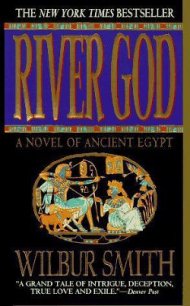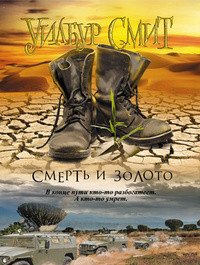Men of Men - Smith Wilbur (книги бесплатно без txt) 📗
Now he crossed the open ground towards Zouga, his stride lithe, his legs long and shapely beneath the short leather kilt.
"Bakela," he said, as he stopped a dozen paces from the gelding's head. "Bakela." He smiled, a brilliant show of white even teeth in the broad and handsome Nguni face.
"That is a name I took with the first draught of my mother's milk, for I am Bazo, the Axe, son of the same Gandang whom you call brother, and who remembers you as an old and trusted friend. I know you by the scar on your cheek and the goid in your beard. I greet you, Bakela."
Zouga swung down off the gelding, leaving the rifle in the saddle scabbard, and, grinning broadly, went to clasp the youth's upper arms in an affectionate salute.
Then, turning with his fists on his hips, still smiling, Zouga shouted to Ralph. "Go and see if you can shoot a springbuc or better even, a wildebeest; we'll need plenty of meat for tonight."
Ralph let out a whoop at the command, and provoked the filly with his heels, forcing her to rear again and then come down in full run, mane flying, hooves pounding as she bore away. Without being ordered, Jan Cheroot shook his bony mare into a canter and followed the flying filly.
The two riders returned in the dusk, and the hunt had gone well. They had found rare quarry, a bull eland so old that his neck and shoulders had turned blue with age and the swinging dewlap almost swept the dusty earth between his stubby forelegs.
He was as big as a prize stud bull, with a chest round as a brandy cask of Limousine oak, and Zouga guessed he would weigh not much under a ton, for he was fat and sleek; there would be a tubful of rich white lard in the chest cavity, and thick layers of yellow fat beneath the glossy hide. He was a prize indeed, and the little band of Matabele drummed their assegai against the hide shields and shouted with delight when they saw him.
The bull snorted at the hubbub and broke into a lumbering gallop, trying to break away, but Ralph swung the filly to head him off and within a hundred yards the bull changed the gallop for a short winded trot and allowed himself to be turned back towards the group of waiting men.
Ralph reined in the filly, kicked his feet from the stirrups and jumped easily to the earth, throwing up the carbine as he landed cat-like on his toes and seeming to fire in the same instant.
The bull's head flinched at the shot, blinking the huge shining eyes convulsively as the bullet slammed into his skull between them, and he collapsed with a meaty thud that seemed to tremble in the earth.
The Matabele streamed out like a pack of wild dogs, swarming over the mountainous carcass, using the razor edge of their war-assegai as butchers" knives, going for the tidbits, the tripes and the liver, the heart and the sweet white fat.
The Matabele gorged on fat eland meat, grilling the tripes over the coals, threading garlands of liver and fat and succulent heart onto wet white mimosa twigs from which they had peeled the bark, so that the melting fat sizzled and bubbled over the layers of meat.
"We have killed no game since we left the forests," Bazo explained their ravenous appetites. Though the desert teemed with springbuck herds, they were not the type of game that a man on foot, armed only with a stabbing spear, could run down easily.
"Without meat a man's belly is like a war drum, full of nothing except noise and wind."
"You are far from the land of the Matabele," Zouga agreed. "No Matabele has been this far south since the old king took the tribe north across the Limpopo, and in that time even Gandang, your father, was a child."
"We are the first to make this journey," Bazo, agreed proudly. "We are the point of the spear."
In the firelight the warriors about him looked up and their expressions echoed his pride in their achievement.
They were all youths, the eldest only a few years older than Bazo, not one of them over nineteen years of age.
"Where does this long journey take you?" Zouga asked.
"To a wonderful place in the south from which a man returns with great treasures."
"What manner of treasures?" Zouga asked again.
"These." Bazo reached across the circle to where Ralph leaned against his saddle, using it as a pillow, and Bazo touched the polished wooden butt of the Martini-Henry that protruded from the gun bucket.
"Isibamu, guns!" said Bazo.
"Guns?" Zouga asked. "A Matabele indoda with a gun?"
His voice mildly derisive. "Is not the assegai the weapon of the true warrior?"
Bazo looked uncomfortable for a moment and then recovered his aplomb.
"The old ways are not always the best," he said. "The old men tell us that they are, so that young men will consider them wise." And the Matabele in the circle about the fire nodded and made little sounds of agreement.
Although he was certainly the youngest of the group, Bazo was clearly their leader. Son of Gandang he was therefore the nephew of King Lobengula, grandson of old King Mzilikazi himself. His noble birth assured him preference, but it was clear that he was quick and clever also.
"To earn the guns you covet a man must work hard, in a deep pit in the earth," Zouga said. "He must milk himself of his sweat by the calabash full every day for three years, before he is paid with a gun."
"We have heard these things," Bazo nodded.
"Then you shall have your guns, each of you a fine gun, at the end of three years. 1, Bakela, the Fist, give you my word on it."
it was a custom of the diggings, a ceremony of initiation, that when a gang of raw tribesmen arrived at New Rush the established black labourers would rush to line each side of the track, most of them dressed in castoff European finery as a badge of their sophistication.
They would jeer their newly arrived brethren: "Behold, the baboons have come down from the hills."
"Nay! Baboons are cunning; these cannot be baboons."
And they pelted the newcomers with pieces of filth as well as insults.
Bazo's group were the first Matabele to reach the diggings. The Matabele language is almost identical to that of Zululand, and very closely associated to the Southern Xhosa. Bazo understood every word of the banter, and he gave a quiet but grim order to his little group.
His men dropped their sleeping-mats and the long shields rattled one against the other, the broad bright assegais whispered in the sunlight as they were bared, and the taunts and derisive laughter dried on the instant, to be replaced with expressions of astonishment and real dismay.
"Man e! Now!" hissed Bazo. The ring of shields exploded outwards, and the crowd fled before it in disordered panic.
From the back of the gelding, Zouga had a grandstand view of the charge, and he had no illusions as to the danger of the moment. Even such a tiny war party of Matabele amadoda on the rampage through the camp could cause chaos and frightful slaughter amongst the unarmed black labourers.
"Bazo! Kawulisa! Stop them!"he roared, spurring across the front of the murderous rank of rawhide shields and steel.
The erstwhile tormentors ran with their heads twisted backwards, yelling with terror and eyes popping. They knocked each other down and the fallen grovelled in the dust. A portly black man, dressed in grubby duck breeches many sizes too small and a frock coat many sizes too large, ran into the side of one of the shacks lining the track, the home of one of the less affluent diggers, and the canvas wall burst open before the power of his run, the thatch roof collapsed on top of the fugitive, covering him completely with a haystack of dried grass and probably saving his life, for the point of a Matabele assegai had been inches from the straining seam of his bulging breeches at the moment the shack collapsed.




